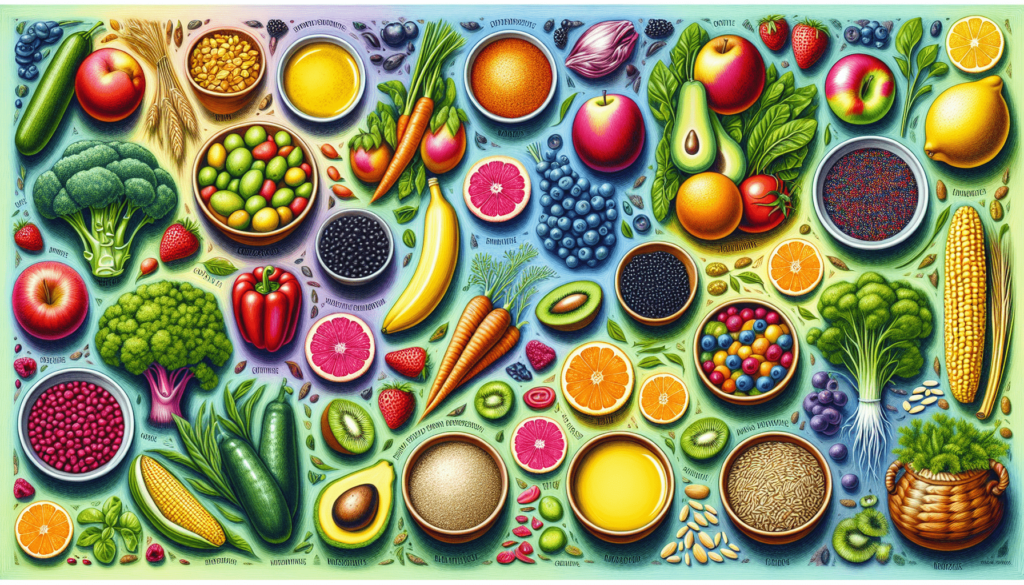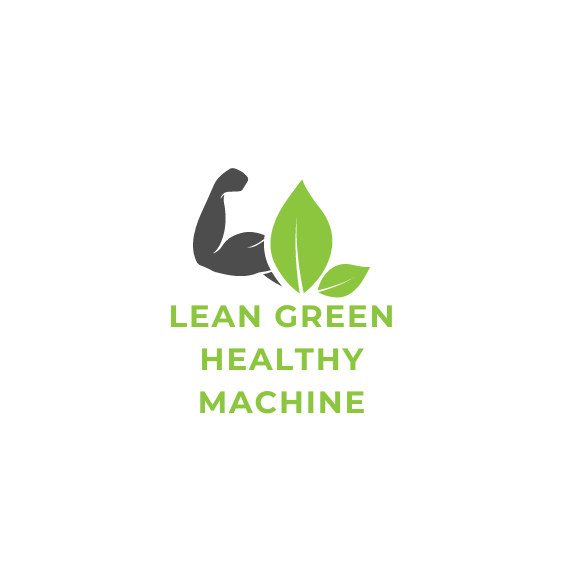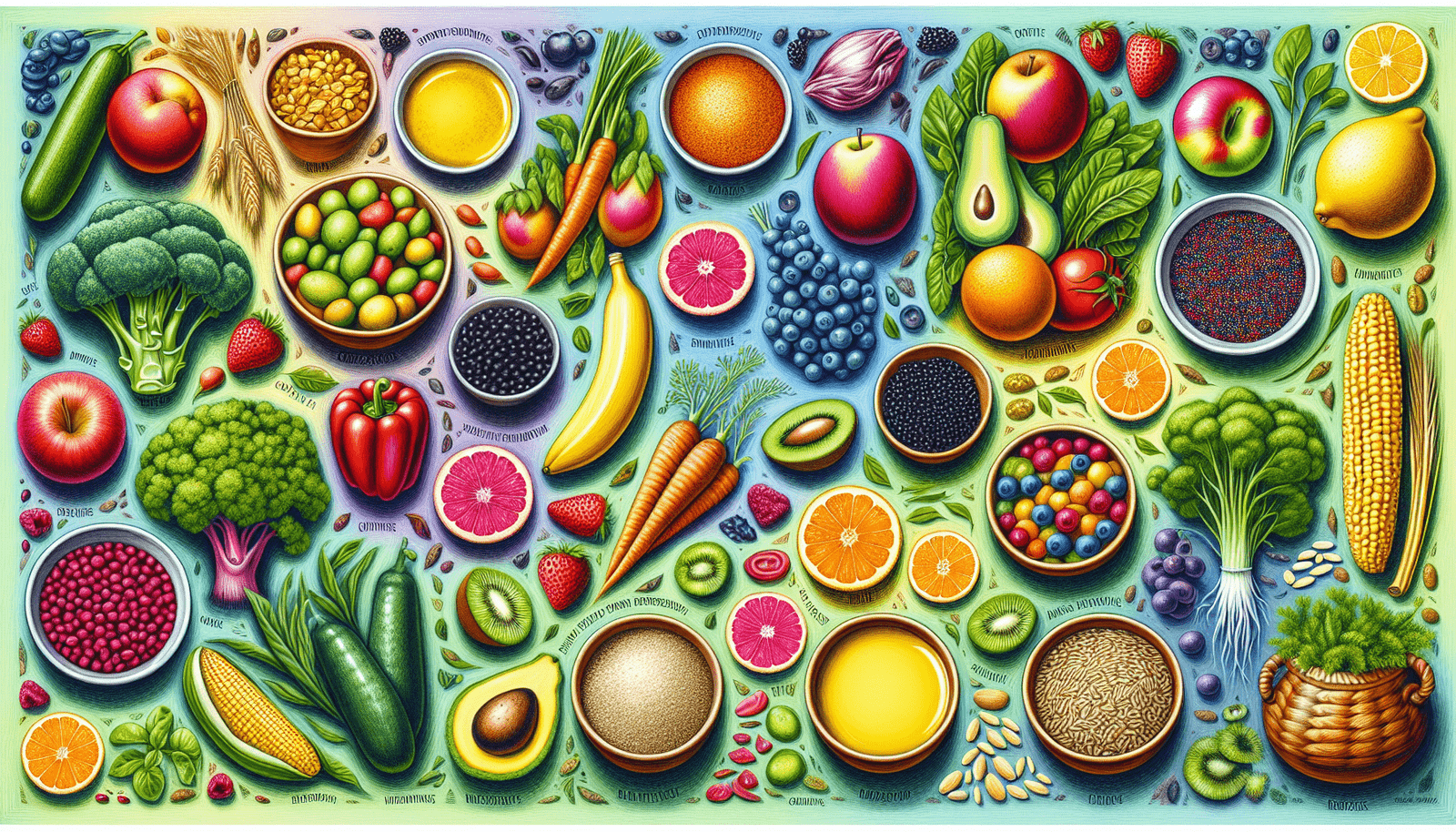In the world of healthy living, where we understand the power of food as medicine and the importance of prevention, there is a wealth of knowledge waiting to be unlocked. Today, we want to take you on a journey into the realm of mood-boosting foods that can naturally combat depression. From nutrient-rich superfoods to plant-based power and intermittent fasting, we will explore the secrets to reducing stress, controlling inflammation, and enhancing your overall well-being. Get ready to embrace a future filled with vitality as we empower you with actionable tips and delicious recipes that will nourish your body and lift your spirits. Join us as we delve into the wonders of 10 mood-boosting foods that will beat the blues and ignite a positive transformation within you.
Heading 1: Introduction
Welcome to the world of healthy living! In this article, we will explore the power of nutrient-rich superfoods and their ability to combat depression naturally. In a society where mental health is becoming increasingly important, it’s essential to discover the connection between what we eat and how we feel. With the right foods, we can boost our mood, reduce the risk of depression, and promote overall well-being.
Heading 2: Understanding Depression
Subheading 1: What is Depression?
Depression is a common mental health condition that affects millions of people worldwide. It is characterized by persistent feelings of sadness, hopelessness, and a loss of interest in activities. Depression can impact all aspects of life, making it difficult for individuals to function and enjoy everyday activities.
Subheading 2: The Link Between Food and Mood
Research has shown that there is a strong connection between our diet and our mental health. Certain foods are known to have mood-boosting properties, while others can potentially worsen symptoms of depression. By incorporating the right foods into your diet, you can support your mental well-being and improve your overall mood.
Subheading 3: The Power of Superfoods
Superfoods are nutrient-dense foods that are particularly beneficial for our health. They are packed with vitamins, minerals, and antioxidants that are known to support brain health and combat depression. In the following sections, we will explore ten mood-boosting superfoods that can naturally help combat depression.

Heading 3: Salmon
Subheading 1: The Benefits of Salmon
salmon is a fatty fish that is rich in omega-3 fatty acids, which are essential for brain health. These fatty acids have been linked to a reduced risk of depression and improved mood. Additionally, salmon is a great source of protein, which provides energy and helps stabilize blood sugar levels.
Subheading 2: How to Incorporate Salmon into Your Diet
Incorporating salmon into your diet is easy and delicious. You can enjoy grilled or baked salmon as a main course, add it to salads, or even include it in hearty whole-grain bowls. Experiment with different recipes and seasonings to find your favorite way to enjoy this mood-boosting superfood.
Subheading 3: Recipe Inspiration – Lemon Garlic Salmon
Try this simple and flavorful recipe for lemon garlic salmon:
Ingredients:
- 2 salmon fillets
- 2 cloves of garlic, minced
- Juice of 1 lemon
- Salt and pepper to taste
- Olive oil
Instructions:
- Preheat the oven to 400°F (200°C).
- Place the salmon fillets on a baking sheet lined with parchment paper.
- Drizzle olive oil over the salmon and season with minced garlic, lemon juice, salt, and pepper.
- Bake for 12-15 minutes, or until the salmon is cooked through and flakes easily with a fork.
- Serve with your favorite side dishes and enjoy the mood-boosting benefits of this delicious meal!
Heading 4: Blueberries
Subheading 1: The Benefits of Blueberries
blueberries are often referred to as “brain berries” due to their high concentration of antioxidants and phytochemicals. These compounds have been shown to protect the brain from oxidative stress and inflammation, which can contribute to depression. Consuming blueberries regularly can help improve cognitive function and enhance mood.
Subheading 2: How to Incorporate Blueberries into Your Diet
Incorporating blueberries into your diet is simple and enjoyable. You can add them to your morning oatmeal, blend them into smoothies, or simply enjoy them as a snack. Their deliciously sweet and tangy flavor makes them a versatile ingredient in various recipes.
Subheading 3: Recipe Inspiration – Blueberry Spinach Smoothie
Start your day on a positive note with this refreshing blueberry spinach smoothie:
Ingredients:
- 1 cup fresh or frozen blueberries
- 1 cup baby spinach
- 1 ripe banana
- 1 cup almond milk
- 1 tablespoon honey (optional)
Instructions:
- Place all the ingredients in a blender and blend until smooth and creamy.
- If desired, add a tablespoon of honey for additional sweetness.
- Pour into a glass, and enjoy the mood-boosting goodness of this delicious smoothie!

Heading 5: Leafy Greens
Subheading 1: The Benefits of Leafy Greens
Leafy greens, such as spinach, kale, and Swiss chard, are loaded with essential nutrients that support brain health and combat depression. They are rich in folate, which plays a crucial role in the production of neurotransmitters that regulate mood. Additionally, leafy greens are packed with vitamins and minerals that promote overall well-being.
Subheading 2: How to Incorporate Leafy Greens into Your Diet
Incorporating leafy greens into your diet can be as simple as adding them to salads, sandwiches, or wraps. You can also sauté them as a side dish or blend them into smoothies for a nutritional boost. Experiment with different recipes and cooking methods to find creative ways to incorporate these mood-boosting greens into your meals.
Subheading 3: Recipe Inspiration – Spinach and Feta Stuffed Chicken Breast
Try this delicious recipe for spinach and feta stuffed chicken breast:
Ingredients:
- 2 boneless, skinless chicken breasts
- 2 cups fresh baby spinach
- 1/2 cup crumbled feta cheese
- 2 cloves of garlic, minced
- Salt and pepper to taste
- Olive oil
Instructions:
- Preheat the oven to 375°F (190°C).
- Butterfly the chicken breasts by slicing them horizontally, leaving one edge uncut.
- Open the chicken breasts like a book and flatten them with a meat mallet or rolling pin.
- Season the chicken breasts with salt, pepper, and minced garlic.
- Arrange the spinach and feta cheese on one side of each chicken breast.
- Fold the other side of the chicken breast over the filling and secure with toothpicks if needed.
- Heat olive oil in an oven-safe skillet over medium-high heat.
- Sear the stuffed chicken breasts on each side until golden brown.
- Transfer the skillet to the preheated oven and bake for 20-25 minutes, or until the chicken is cooked through.
- Allow the chicken to rest for a few minutes before serving. Remove toothpicks if used.
- Enjoy this flavorful and nutritious dish that combines the mood-boosting power of spinach with the richness of feta cheese!
Heading 6: Plant-Based Power
Subheading 1: The Benefits of Plant-Based Foods
A plant-based diet can provide numerous benefits for mental health and well-being. Fruits, vegetables, whole grains, legumes, and nuts are rich in essential vitamins, minerals, and antioxidants that support brain health and reduce the risk of depression. By incorporating more plant-based foods into your diet, you can nourish your body and mind.
Subheading 2: How to Incorporate Plant-Based Foods into Your Diet
Incorporating more plant-based foods into your diet is easier than you might think. Start by adding an extra serving of fruits or vegetables to each meal. Experiment with plant-based protein sources such as tofu, tempeh, and lentils. Gradually increase the amount of plant-based foods in your diet while still enjoying animal products in moderation if you choose to.
Subheading 3: Recipe Inspiration – Quinoa Buddha Bowl
Try this vibrant and nutritious recipe for a quinoa Buddha bowl:
Ingredients:
- 1 cup cooked quinoa
- 1 cup mixed vegetables of your choice (e.g., roasted sweet potatoes, steamed broccoli, sautéed bell peppers)
- 1/2 cup chickpeas, rinsed and drained
- 1/4 cup hummus
- 1 tablespoon tahini
- Fresh lemon juice
- Salt and pepper to taste
Instructions:
- In a bowl, combine quinoa, mixed vegetables, and chickpeas.
- Drizzle with hummus, tahini, and lemon juice.
- Season with salt and pepper to taste.
- Mix well to combine all the flavors.
- Enjoy the nourishing goodness of this plant-based Buddha bowl that is packed with mood-boosting nutrients!
Heading 7: Intermittent Fasting
Subheading 1: The Benefits of Intermittent Fasting
Intermittent fasting is an eating pattern that alternates between periods of fasting and eating. It has gained popularity for its numerous health benefits, including its positive impact on mental well-being. When practiced under proper guidance, intermittent fasting can improve brain function, reduce inflammation, and support overall mental health.
Subheading 2: How to Incorporate Intermittent Fasting
Before starting intermittent fasting, it is important to consult with a healthcare professional or a registered dietitian to ensure it is suitable for you. There are various methods of intermittent fasting, such as the 16/8 method or alternate-day fasting. Find a fasting schedule that works for you and gradually incorporate it into your lifestyle.
Subheading 3: Tips for Successful Intermittent Fasting
- Stay hydrated: Drink plenty of water during fasting periods to stay hydrated and curb hunger.
- Focus on nutrient-dense foods: When breaking your fast, choose foods that are rich in nutrients to nourish your body and support mental well-being.
- Listen to your body: Pay attention to your hunger and fullness cues. It’s important to eat to satisfy your hunger and stop when you feel comfortably full.
- Mix it up: Incorporate a variety of foods into your eating window to ensure you are getting all the essential nutrients your body needs.
- Be flexible: Intermittent fasting doesn’t have to be rigid. Adjust the schedule to fit your lifestyle and make it sustainable in the long term.
Heading 8: Dark Chocolate
Subheading 1: The Benefits of Dark Chocolate
Good news for chocolate lovers – dark chocolate can actually be good for your mood! Dark chocolate is high in antioxidants and contains compounds that stimulate the production of endorphins, the feel-good hormones. Additionally, it contains magnesium, which plays a role in promoting relaxation and reducing anxiety.
Subheading 2: How to Incorporate Dark Chocolate into Your Diet
Incorporating dark chocolate into your diet can be a guilt-free indulgence. Look for dark chocolate with a high percentage of cocoa (70% or higher) to get the most health benefits. Enjoy a square or two as a snack, or use it as an ingredient in healthy desserts and treats.
Subheading 3: Recipe Inspiration – Dark Chocolate Berry Bark
Indulge in this simple and delicious recipe for dark chocolate berry bark:
Ingredients:
- 8 ounces dark chocolate, chopped
- 1/4 cup mixed dried berries (e.g., cranberries, goji berries, blueberries)
- 1/4 cup mixed nuts, chopped (e.g., almonds, walnuts, pistachios)
Instructions:
- Line a baking sheet with parchment paper.
- Melt the dark chocolate in a heatproof bowl set over a pan of simmering water.
- Once melted, pour the chocolate onto the prepared baking sheet and spread it into an even layer.
- Sprinkle the dried berries and chopped nuts over the melted chocolate, gently pressing them in.
- Place the baking sheet in the refrigerator for at least 1 hour, or until the chocolate is set.
- Once set, break the bark into smaller pieces and enjoy as a mood-boosting snack!
Heading 9: Debunking Detox Myths
Subheading 1: The Truth About Detoxes
Detox diets and cleanses have gained popularity in recent years, promising a range of health benefits, including improved mental well-being. However, it’s important to understand that our bodies have their own detoxification systems in place, primarily the liver and kidneys. While certain foods and practices can support the body’s natural detox process, there is no need for extreme detox diets or cleanses.
Subheading 2: Focus on Overall Nutrition
Instead of focusing on short-term detox diets, it’s crucial to prioritize overall nutrition and a balanced diet. Consuming a variety of whole foods, including fruits, vegetables, lean proteins, and whole grains, provides the body with essential nutrients and supports optimal functioning. This, in turn, can positively impact mental health and well-being.
Subheading 3: Creating a Balanced Eating Plan
- Fill half your plate with vegetables and fruits: Aim to consume a variety of colorful fruits and vegetables with each meal.
- Choose whole grains: Opt for whole grains such as quinoa, brown rice, and whole wheat bread, which are rich in fiber and nutrients.
- Include lean proteins: Incorporate lean proteins like poultry, fish, beans, and tofu to provide essential amino acids and support brain health.
- Limit processed foods: Minimize your intake of processed foods that are high in added sugars, unhealthy fats, and artificial ingredients.
- Hydrate adequately: Drink plenty of water throughout the day to support overall health and promote optimal brain function.
Heading 10: Conclusion
Incorporating mood-boosting foods into your diet can have a significant impact on your mental well-being. Salmon, blueberries, leafy greens, and dark chocolate are just a few examples of the nutritious superfoods that can naturally combat depression. By paying attention to your diet and making informed food choices, you can take control of your mental health and unlock a future brimming with vitality. Remember, nourishing your body also nourishes your mind, so embrace the power of food as your ally in the fight against the blues.

